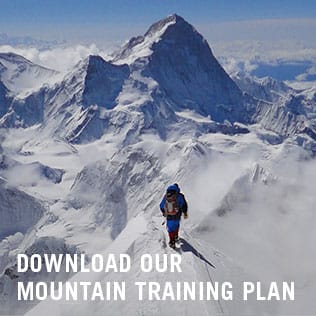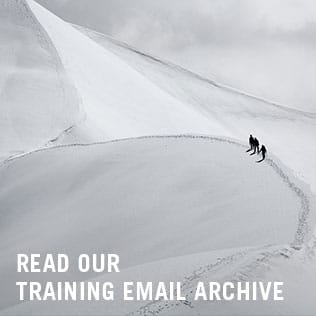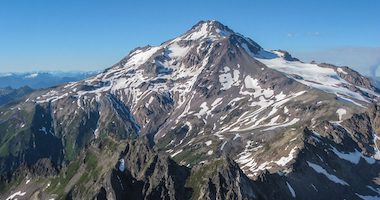Physical Preparation
The McKinley-West Buttress Expedition involves navigating steep climbs, glacier travel, and pulling a sled weighing 40-50 pounds. You will engage in strenuous physical activities for multiple hours over consecutive days, culminating in a 12-14+ hour summit day. The physical demands of McKinley are immense, and climbers must arrive not only in top physical condition but also confident in their mountaineering skills.
McKinley demands physical fitness more than any other Seven Summits peak. The mountain's extreme conditions require a high degree of physical preparation and mental toughness. To ensure a successful climb, especially if you are aiming for the McKinley - West Buttress Expedition, it's essential to start your preparation early and approach your training intentionally and strategically. This guide will delve deeper into the crucial aspects of fitness training and conditioning, ensuring you are in the best shape for this adventure. For more in-depth explanations on how to create a mountaineering training plan, click here.



Starting Your Training: The Basics
Begin Now: Initiate a rigorous fitness and training regimen immediately. As your climb approaches, the goal is to build your strength, stamina, and skills progressively.
Customized Training: Tailor your workouts to mimic the physical and technical demands of the climb. As your expedition nears, your training should increasingly reflect the challenges you will face on McKinley. Over our decades of experience, we've developed mountaineering training materials right here at your fingertips.
Key Areas of Focus
Endurance Training: Engage in long-distance running, cycling, or rowing activities. These exercises should be part of your routine at least three to four times a week, gradually increasing in duration and intensity. Aim to build your aerobic base over six months before the trip, ideally spending at least 10 hours per week on aerobic training.
Comprehensive Conditioning: Include exercises that build leg strength, such as squats and lunges, and core stability exercises, like planks and Russian twists. Upper body strength is crucial for managing your gear, so incorporate pull-ups, push-ups, and overhead presses. Given the heavy loads, McKinley requires more strength training than other expeditions.
Simulated Climbing: Practice hiking with a weighted pack and engage in pulling exercises that mimic sled pulling on glaciers. Increase the weight and intensity as your fitness improves. Aim to hike for 6-8 hours with a 60 lb pack, ascending 4,000 feet daily, and repeat this several days in a row.
Flexibility and Recovery
Dynamic and Static Stretching: Incorporate both types of stretching into your routine to enhance muscle elasticity and reduce the risk of injury. Yoga can also be a valuable addition to improve flexibility and mental focus.
Rest and Nutrition: Ensure adequate rest days are built into your training schedule. Nutrition plays a critical role in recovery, so maintain a balanced diet of proteins, carbohydrates, and essential fats.
Mental Preparation
Climbing McKinley is not just a physical challenge but a mental one. The mountain’s extreme conditions and extended expedition length can test even the most seasoned climbers. Preparing mentally is crucial for maintaining resilience and a positive attitude throughout your journey. Here are some strategies to help you mentally prepare for McKinley:
Plan for Downtime
One of the unique aspects of a McKinley climb is the significant amount of downtime spent in tents due to weather delays. Preparing for these periods in advance can help maintain your mental well-being. Download a variety of books, movies, and podcasts to keep you entertained and engaged. Consider bringing a journal to document your experience and reflect on your journey. Engaging in hobbies or mindfulness practices like meditation can also help maintain mental clarity and reduce stress.
Practice Patience and Positivity
Weather on McKinley can be highly unpredictable, leading to potential delays and extended stays at higher camps. Prepare yourself by cultivating patience and a positive mindset before the climb. Remind yourself that delays are part of the experience and are essential for safety. Practice positive self-talk and visualization techniques to maintain a hopeful and optimistic outlook, even when plans change unexpectedly.

Stay Connected with Loved Ones
Being away from friends and family for an extended period can be challenging. Prepare for this by setting up ways to stay connected. Write letters or keep a journal to share your experiences with loved ones when you return. Bring personal mementos or photos that remind you of home. Preparing in advance to stay connected can help mitigate feelings of loneliness and homesickness.
Develop Mental Resilience
Building mental resilience before your climb is crucial. Engage in activities that challenge your mental toughness, such as long hikes or endurance sports. Practice visualization techniques, from setting up camp to reaching the summit, imagining successful scenarios. Develop a routine of mindfulness or meditation exercises to help manage stress and anxiety. These practices can help you stay focused and strong despite your challenges on McKinley.

Prepare for Flexibility
Flexibility is key when climbing McKinley. Prepare yourself mentally for the possibility of changing plans. Practice adapting to new situations in your daily life to build this skill. This adaptability will help you handle the dynamic nature of high-altitude mountaineering and keep you focused on your ultimate goal.
Build Team Dynamics
Your team is your support system on the mountain. Before the climb, get to know your team members. Engage in team-building activities and establish clear communication channels. Building solid relationships and trust within your team can create a supportive environment that enhances morale and helps everyone overcome challenges together.
Don't Skip on Mental Prep!
Mental preparation is as important as physical training for climbing McKinley. By planning for downtime, practicing patience and positivity, staying connected with loved ones, developing mental resilience, preparing for flexibility, and building strong team dynamics, you can enhance your overall experience and increase your chances of a successful summit. Take the time to prepare mentally for the challenges ahead, and you’ll be well-equipped to tackle McKinley confidently.
















